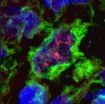Using viruses to beat superbugs
2012-03-26
(Press-News.org) Viruses that can target and destroy bacteria have the potential to be an effective strategy for tackling hard-to-treat bacterial infections. The development of such novel therapies is being accelerated in response to growing antibiotic resistance, says Dr David Harper at the Society for General Microbiology's Spring Conference in Dublin.
Bacteriophages are viruses that can infect bacteria and multiply within them, breaking down the cell and destroying the bacteria - amplifying themselves in the process to deal with more bacteria. They are found everywhere including in river water, soil, sewage and on the human body. Soon after their initial discovery in 1915, bacteriophages were investigated as antibacterial therapeutic agents. A limited understanding of their mode of action meant early work was often unsuccessful and with the advent of the chemical antibiotic era, bacteriophages were passed over as therapeutics.
Dr Harper, Chief Scientific Officer at AmpliPhi Bioscience in Bedfordshire explains why bacteriophages are being revisited as antibacterial agents. "Each bacteriophage is highly specific to a certain type of bacteria and needs the right bacterial host cell in order to multiply. The more bacterial targets there are, the quicker they grow by killing the host cells. Therefore it seems very likely that infections harbouring high numbers of bacteria will benefit most from bacteriophage therapy – for example chronically infected ears, lungs and wounds," he said. "For these types of infection, only a tiny dose of the virus is needed - as small as one thousandth of a millionth of a gram. This can usually be administered directly to the site of infection in a spray, drops or a cream. The major advantage to bacteriophages is that they don't infect human cells so seem likely to be very safe to use."
Increasing resistance to antibiotics has meant that bacterial infections are becoming more and more difficult to treat. With fewer antibiotics available to treat drug-resistant infections, research into bacteriophage therapy has been accelerated. "The rate of new antibiotics coming onto the market does not match the rate of increasing drug-resistance. The need for new approaches to counter such high resistance is both urgent and vital. New approaches will save lives," stressed Dr Harper.
Clinical trials for bacteriophage therapy are now underway. The first clinical trial for safety was reported in 2005 and the results demonstrating the effectiveness of bacteriophage therapy were published in 2009. This clinical trial was conducted by AmpliPhi. The company is planning further clinical trials in conditions where existing antibacterial therapies are not able to help. "With the results of further clinical trials, once regulatory issues are overcome and future investment secured in this area of research, this should lead to the development of novel products suitable for widespread use to tackle bacterial diseases and overcome antibiotic resistance", said Dr Harper.
###
END
ELSE PRESS RELEASES FROM THIS DATE:
2012-03-26
In a report published in recent weeks, Technology Evaluation Centers (TEC) announced that The Answer Company is the newest recipient of its Accreditation for Enterprise Resource Planning (ERP) Providers. The Answer Company, with offices in Vancouver, Calgary and Toronto, is the first ERP reseller in Western Canada to receive the rigorous TEC Accreditation, demonstrating its commitment to show prospective and existing clientele that users of the company's solutions are confident in the abilities and services.
Recent emphasis on the high failure rate of software implementations, ...
2012-03-26
UCLA researchers pinpointed a new mechanism that potently activates T-cells, the group of white blood cells that play a major role in fighting infections.
Published March 25 online in Nature Medicine, the team specifically studied how dendritic cells, immune cells located at the site of infection, become more specialized to fight the leprosy pathogen known as Mycobacterium leprae. Dendritic cells, like scouts in the field of a military operation, deliver key information about an invading pathogen that helps activate the T-cells in launching a more effective attack.
It ...
2012-03-26
Personal injury attorney Clyde J. "Jay" Jackson III, of Abraham, Watkins, Nichols, Sorrels, Agosto and Friend in Houston, Texas, was honored this month by the State Bar of Texas for his exceptional contributions in 2011 to the organization's legal education efforts. Mr. Jackson was one of only six volunteer lawyers who were recognized by the TexasBarCLE, the division of the bar that provides continuing legal education.
Explaining the significance of the "Standing Ovation" award, TexasBarCLE Director Patrick said, "All of our volunteers deserve ...
2012-03-26
BOSTON, MA—Human geneticists have long debated whether the genetic risk of the most common medical conditions derive from many rare mutations, each conferring a high degree of risk in different people, or common differences throughout the genome that modestly influence risk.
A new study by Brigham and Women's Hospital (BWH) researchers has harnessed data and new analysis tools to address this question in four common diseases: rheumatoid arthritis; celiac disease; coronary artery disease and myocardial infarction (heart attack); and type 2 diabetes.
The study will ...
2012-03-26
A vaccine could be developed to prevent Campylobacter being carried in chickens. This approach could drastically cut the number of cases of food poisoning, saving the UK economy millions each year, says an American scientist presenting his work at the Society for General Microbiology's Spring Conference in Dublin.
Food-borne illness costs the UK an estimated £2 billion each year. Campylobacter is the leading cause of food-borne illness and is responsible for about 30% of cases in the UK. Campylobacter jejuni was responsible for more than 371,000 estimated cases in England ...
2012-03-26
The quantum physics of massive particles has intrigued physicists for more than 80 years, since it predicts that even complex particles can exhibit wave-like behaviour – in conflict with our everyday ideas of what is real or local. An international team of scientists now succeeded in shooting a movie which shows the build-up of a matter-wave interference pattern from single dye molecules which is so large (up to 0.1 mm) that you can easily see it with a camera.
This visualizes the dualities of particle and wave, randomness and determinism, locality and delocalization ...
2012-03-26
Wearing seatbelts saves lives. A new Illinois seatbelt law intends to get more people wearing seatbelts and thus save more lives.
Starting the first day of 2012 the new seatbelt law requires that all passengers in vehicles need to wear seatbelts with some exceptions. Prior to the new law only passengers in the front seat and children riding in the backseat were required to wear seatbelts. Under the new law everyone in the car needs to wear a seatbelt regardless of age or seat positioning unless they are exempt of the law. A minimum fine of $25 is imposed for violators ...
2012-03-26
It can be difficult to uncover the behavior of small, shy, nocturnal primates like the brown mouse lemur (Microcebus rufus), especially in the dense rainforests of Madagascar where this lemur lives. New research published in BioMed Central's open access journal BMC Ecology shows that the social interactions of brown mouse lemurs can be monitored by mapping the transfer of tagged lice.
Brown mouse lemurs are the only known host of the parasitic louse Lemurpediculus verruculosus. The lice have evolved to stay attached to the sparse hair on the lemurs' ears, where they feed ...
2012-03-26
Expert mobile marketing consultant Mark Stafford and his Phoenix Business Consulting Firm Arizona Social Media LLC have just launched a new website to help small businesses become mobile friendly on the internet and avoid "small screen syndrome".
82% of small business websites do not display correctly on the average smartphone thus the user must "slide & pinch" the webpage on their smartphone screen in order to consume the content.
Many small business owners do not realize what they are up against in this new "mobile marketplace":
- More ...
2012-03-26
The past decade has been one of unprecedented weather extremes. Scientists of the Potsdam Institute for Climate Impact Research (PIK) in Germany argue that the high incidence of extremes is not merely accidental. From the many single events a pattern emerges. At least for extreme rainfall and heat waves the link with human-caused global warming is clear, the scientists show in a new analysis of scientific evidence in the journal Nature Climate Change. Less clear is the link between warming and storms, despite the observed increase in the intensity of hurricanes.
In 2011 ...
LAST 30 PRESS RELEASES:
[Press-News.org] Using viruses to beat superbugs




